This Week at READ USA
Thank You, News4Jax & Melanie Lawson!
- Read USA Inc.
- April 26 2023
Yesterday, the students at R.L. Brown Academy in the Historic Eastside received not one but two special treats: yesterday was READ USA Book Fair day – giving each student two FREE, brand-new books to build their at-home libraries – AND they received a visit from News4Jax’s Melanie Lawson!
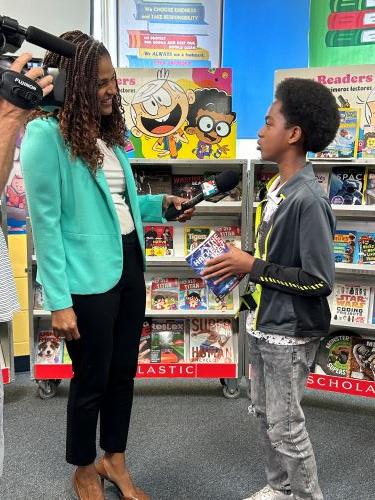
READ USA is honored and grateful to be selected as News4Jax’s Positively Jax organization for April and May. As part of this, News4Jax is airing several commercials to help spread awareness of READ USA’s Book Fairs and our need for volunteers (maybe you have seen them?!). But the icing on the cake was Melanie joining us LIVE from R.L. Brown during The Morning Show yesterday! We are so thankful for the stories she and the News4Jax team aired throughout the morning – and the students had so much fun getting to meet and talk with Melanie. She is truly a community ambassador in every sense of the word!
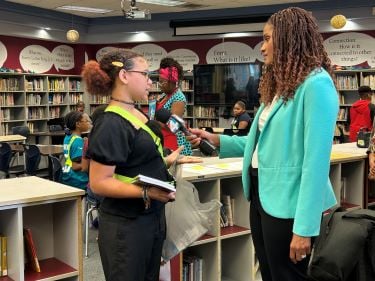
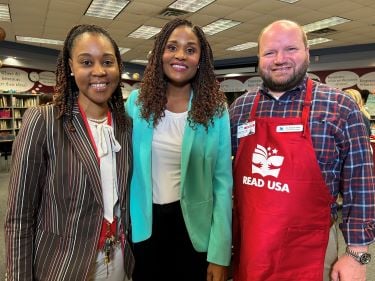
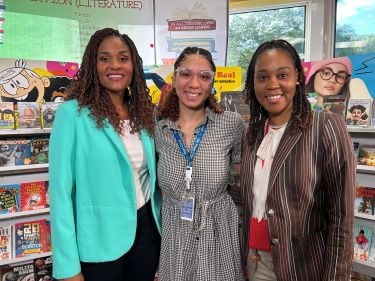
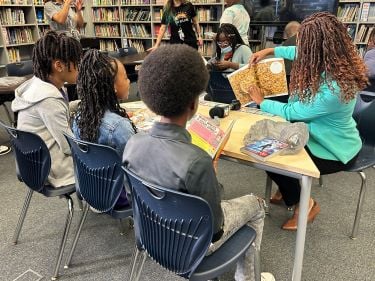
Many thanks to R.L. Brown Academy’s Principal Mrs. Kincaid, 5th-grade reading teacher Mrs. Walter, our amazing volunteers and staff, and our very own READ USA Board Member Dr. Rudy Jamison for interviewing with Melanie and helping make the whole morning run smoothly!
Check out the segments here in case you missed them!
Volunteers are needed almost daily through May 26, so sign up today! You can also select the school(s) you want to support.
Children’s Book: Jayden’s Impossible Garden, by Melina Mangal
Illustrated by Ken Daley
Jayden’s Impossible Garden is a timeless story of intergenerational friendships and the power of imagination and determination in bringing a vision of a community garden to life. Jayden, a young boy, sees nature everywhere, even in the middle of the city. He watches squirrels searching for food, cardinals calling, and dandelions growing. His Mama doesn’t see what Jayden sees and believes “there is no nature in the middle of the city.” 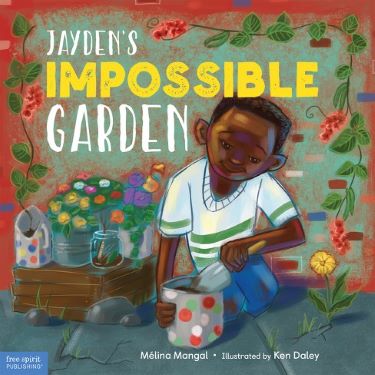 With the help of his friend, Mr. Curtis, Jayden creates a magical garden, full of flowers, birds, nests, and butterflies. Jayden brings together his neighbors – and Mama – to experience the magic of nature in the middle of the city. Jayden’s love of nature can inspire all of us to see our surroundings as overflowing with opportunities for growth and connection.
With the help of his friend, Mr. Curtis, Jayden creates a magical garden, full of flowers, birds, nests, and butterflies. Jayden brings together his neighbors – and Mama – to experience the magic of nature in the middle of the city. Jayden’s love of nature can inspire all of us to see our surroundings as overflowing with opportunities for growth and connection.
Jayden’s Impossible Garden may also be enjoyed as a read-aloud by Alex Elias, President of The Rotaract Club of Jacksonville’s Beaches. The read-aloud is available on the READ USA website here.
Submitted by Kathi Hart, Tutoring Program Content Specialist
Parent Education Corner: The Rhythm and Rhyme of Poetry
One of our most important goals as parents and caregivers of young children is to prepare them for success as readers and writers. Research tells us that children are more likely to be successful in reading and writing a word if they’ve had experience with hearing and saying the individual sounds in the word. Studies have also shown that an effective activity to support this is repeated readings of literature selections that “play” with language sounds.
Poetry is ideally suited to provide repeated experiences with the sounds of language. The brevity of words, rhythmic language, and frequently occurring rhyming patterns encourage ears to listen and mouths to repeat the sounds and words. And poems very often invite children to reflect … and laugh!
“Experts in literacy and child development have discovered that if children know eight nursery rhymes by heart by the time they’re four years old, they’re usually among the best readers by the time they’re eight.” – Mem Fox, Reading Magic
The playful language of nursery rhymes and other children’s poems is best enjoyed when they are read aloud. The benefits of teaching your child nursery rhymes and other children’s poems include:
- Developing phonemic awareness – Nursery rhymes help children develop an “ear” for rhyme and alliteration. For example, “Hey Diddle, Diddle” contains these rhyme pairs: diddle/fiddle, moon/spoon; and the repetition of the consonant d in “Hey Diddle, diddle.”
- Understanding of concepts – Nursery rhymes support vocabulary development. Children learn to understand abstract concepts like big, small, up, down, first and last. For example, Hickory, dickory, dock. The mouse ran up the clock. The clock struck one, the mouse ran down! Hickory, dickory, dock.
- Listening skills – When you read nursery rhymes to your child, you are telling them a story. Because of the rhyming words, the storyline, and your enthusiasm, children are lured into the story and pay attention to you. This helps them become better listeners.
The beauty of nursery rhymes and other children’s poems is that they can be recited anywhere and at any time. They can be included in your everyday life – when you are in the car, going for a walk, making lunch, or getting ready for bed. Recite nursery rhymes with your children whenever and wherever you have the opportunity and get them to join in.
Here are a few suggestions of well-loved nursery rhymes:
- Itsy, Bitsy Spider
- Humpty Dumpty
- Twinkle, Twinkle Little Star
- Mary Had a Little Lamb
- One, Two, Buckle My Shoe
- Row, Row, Row Your Boat
Submitted by Kathi Hart, Tutoring Program Content Specialist
Do you have any questions or ideas for the Parent Education Corner? Anything you’d like to learn? Let us know here!
